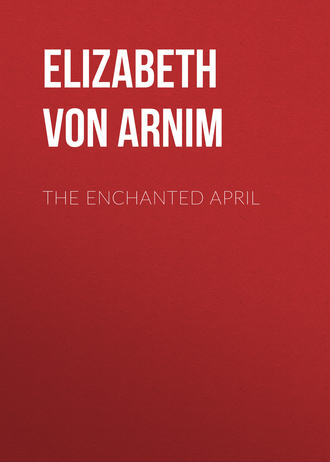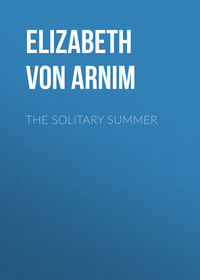 полная версия
полная версияThe Enchanted April
The bedrooms and two of the sitting-rooms at San Salvatore were on the top floor, and opened into a roomy hall with a wide glass window at the north end. San Salvatore was rich in small gardens in different parts and on different levels. The garden this window looked down on was made on the highest part of the walls, and could only be reached through the corresponding spacious hall on the floor below. When Mrs. Wilkins came out of her room this window stood wide open, and beyond it in the sun was a Judas tree in full flower. There was no sign of anybody, no sound of voices or feet. Tubs of arum lilies stood about on the stone floor, and on a table flamed a huge bunch of fierce nasturtiums. Spacious, flowery, silent, with the wide window at the end opening into the garden, and the Judas tree absurdly beautiful in the sunshine, it seemed to Mrs. Wilkins, arrested on her way across to Mrs. Arbuthnot, too good to be true. Was she really going to live in this for a whole month? Up to now she had had to take what beauty she could as she went along, snatching at little bits of it when she came across it—a patch of daisies on a fine day in a Hampstead field, a flash of sunset between two chimney pots. She had never been in definitely, completely beautiful places. She had never been even in a venerable house; and such a thing as a profusion of flowers in her rooms was unattainable to her. Sometimes in the spring she had bought six tulips at Shoolbred's, unable to resist them, conscious that Mellersh if he knew what they had cost would think it inexcusable; but they had soon died, and then there were no more. As for the Judas tree, she hadn't an idea what it was, and gazed at it out there against the sky with the rapt expression of one who sees a heavenly vision.
Mrs. Arbuthnot, coming out of her room, found her there like that, standing in the middle of the hall staring.
"Now what does she think she sees now?" thought Mrs. Arbuthnot.
"We are in God's hands," said Mrs. Wilkins, turning to her, speaking with extreme conviction.
"Oh!" said Mrs. Arbuthnot quickly, her face, which had been covered with smiles when she came out of her room, falling. "Why, what has happened?"
For Mrs. Arbuthnot had woken up with such a delightful feeling of security, of relief, and she did not want to find she had not after all escaped from the need of refuge. She had not even dreamed of Frederick. For the first time in years she had been spared the nightly dream that he was with her, that they were heart to heart, and its miserable awakening. She had slept like a baby, and had woken up confident; she had found there was nothing she wished to say in her morning prayer, except Thank you. It was disconcerting to be told she was after all in God's hands.
"I hope nothing has happened?" she asked anxiously.
Mrs. Wilkins looked at her a moment, and laughed. "How funny," she said, kissing her.
"What is funny?" asked Mrs. Arbuthnot, her face clearing because Mrs. Wilkins laughed.
"We are. This is. Everything. It's all so wonderful. It's so funny and so adorable that we should be in it. I daresay when we finally reach heaven—the one they talk about so much—we shan't find it a bit more beautiful."
Mrs. Arbuthnot relaxed to smiling security again. "Isn't it divine?" she said.
"Were you ever, ever in your life so happy?" asked Mrs. Wilkins, catching her by the arm.
"No," said Mrs. Arbuthnot. Nor had she been; not ever; not even in her first love-days with Frederick. Because always pain had been close at hand in that other happiness, ready to torture with doubts, to torture even with the very excess of her love; while this was the simple happiness of complete harmony with her surroundings, the happiness that asks for nothing, that just accepts, just breathes, just is.
"Let's go and look at that tree close," said Mrs. Wilkins. "I don't believe it can only be a tree."
And arm in arm they went along the hall, and their husbands would not have known them their faces were so young with eagerness, and together they stood at the open window, and when their eyes, having feasted on the marvelous pink thing, wandered farther among the beauties of the garden, they saw sitting on the low wall at the east edge of it, gazing out over the bay, her feet in lilies, Lady Caroline.
They were astonished. They said nothing in their astonishment, but stood quite still, arm in arm, staring down at her.
She too had on a white frock, and her head was bare. They had had no idea that day in London, when her hat was down to her nose and her furs were up to her ears, that she was so pretty. They had merely thought her different from the other women in the club, and so had the other women themselves, and so had all the waitresses, eyeing her sideways and eyeing her again as they passed the corner where she sat talking; but they had had no idea she was so pretty. She was exceedingly pretty. Everything about her was very much that which it was. Her fair hair was very fair, her lovely grey eyes were very lovely and grey, her dark eyelashes were very dark, her white skin was very white, her red mouth was very red. She was extravagantly slender— the merest thread of a girl, though not without little curves beneath her thin frock where little curves should be. She was looking out across the bay, and was sharply defined against the background of empty blue. She was full in the sun. Her feet dangled among the leaves and flowers of the lilies just as if it did not matter that they should be bent or bruised.
"She ought to have a headache," whispered Mrs. Arbuthnot at last, "sitting there in the sun like that."
"She ought to have a hat," whispered Mrs. Wilkins.
"She is treading on lilies."
"But they're hers as much as ours."
"Only one-fourth of them."
Lady Caroline turned her head. She looked up at them a moment, surprised to see them so much younger than they had seemed that day at the club, and so much less unattractive. Indeed, they were really almost quite attractive, if any one could ever be really quite attractive in the wrong clothes. Her eyes, swiftly glancing over them, took in every inch of each of them in the half second before she smiled and waved her hand and called out Good-morning. There was nothing, she saw at once to be hoped for in the way of interest from their clothes. She did not consciously think this, for she was having a violent reaction against beautiful clothes and the slavery they impose on one, her experience being that the instant one had got them they took one in hand and gave one no peace till they had been everywhere and been seen by everybody. You didn't take your clothes to parties; they took you. It was quite a mistake to think that a woman, a really well-dressed woman, wore out her clothes; it was the clothes that wore out the woman—dragging her about at all hours of the day and night. No wonder men stayed younger longer. Just new trousers couldn't excite them. She couldn't suppose that even the newest trousers ever behaved like that, taking the bit between their teeth. Her images were disorderly, but she thought as she chose, she used what images she like. As she got off the wall and came towards the window, it seemed a restful thing to know she was going to spend an entire month with people in dresses made as she dimly remembered dresses used to be made five summers ago.
"I got here yesterday morning," she said, looking up at them and smiling. She really was bewitching. She had everything, even a dimple.
"It's a great pity," said Mrs. Arbuthnot, smiling back, "because we were going to choose the nicest room for you."
"Oh, but I've done that," said Lady Caroline. "At least, I think it's the nicest. It looks two ways—I adore a room that looks two ways, don't you? Over the sea to the west, and over this Judas tree to the north."
"And we had meant to make it pretty for you with flowers," said Mrs. Wilkins.
"Oh, Domenico did that. I told him to directly I got here. He's the gardener. He's wonderful."
"It's a good thing, of course," said Mrs. Arbuthnot a little hesitatingly, "to be independent, and to know exactly what one wants."
"Yes, it saves trouble," agreed Lady Caroline.
"But one shouldn't be so independent," said Mrs. Wilkins, "as to leave no opportunity for other people to exercise their benevolences on one."
Lady Caroline, who had been looking at Mrs. Arbuthnot, now looked at Mrs. Wilkins. That day at the queer club she had had merely a blurred impression of Mrs. Wilkins, for it was the other one who did all the talking, and her impression had been of somebody so shy, so awkward that it was best to take no notice of her. She had not even been able to say good-bye properly, doing it in an agony, turning red, turning damp. Therefore she now looked at her in some surprise; and she was still more surprised when Mrs. Wilkins added, gazing at her with the most obvious sincere admiration, speaking indeed with a conviction that refused to remain unuttered, "I didn't realize you were so pretty."
She stared at Mrs. Wilkins. She was not usually told this quite so immediately and roundly. Abundantly as she was used to it— impossible not to be after twenty-eight solid years—it surprised her to be told it with such bluntness, and by a woman.
"It's very kind of you to think so," she said.
"Why, you're very lovely," said Mrs. Wilkins. "Quite, quite lovely."
"I hope," said Mrs. Arbuthnot pleasantly, "you make the most of it."
Lady Caroline then stared at Mrs. Arbuthnot. "Oh yes," she said. "I make the most of it. I've been doing that ever since I can remember."
"Because," said Mrs. Arbuthnot, smiling and raising a warning forefinger, "it won't last."
Then Lady Caroline began to be afraid these two were originals. If so, she would be bored. Nothing bored her so much as people who insisted on being original, who came and buttonholed her and kept her waiting while they were being original. And the one who admired her— it would be tiresome if she dogged her about in order to look at her. What she wanted of this holiday was complete escape from all she had had before, she wanted the rest of complete contrast. Being admired, being dogged, wasn't contrast, it was repetition; and as for originals, to find herself shut up with two on the top of a precipitous hill in a medieval castle built for the express purpose of preventing easy goings out and in, would not, she was afraid, be especially restful. Perhaps she had better be a little less encouraging. They had seemed such timid creatures, even the dark one—she couldn't remember their names—that day at the club, that she had felt it quite safe to be very friendly. Here they had come out of their shells; already; indeed, at once. There was no sign of timidity about either of them here. If they had got out of their shells so immediately, at the very first contact, unless she checked them they would soon begin to press upon her, and then good-bye to her dream of thirty restful, silent days, lying unmolested in the sun, getting her feathers smooth again, not being spoken to, not waited on, not grabbed at and monopolized, but just recovering from the fatigue, the deep and melancholy fatigue, of the too much.
Besides, there was Mrs. Fisher. She too must be checked. Lady Caroline had started two days earlier than had been arranged for two reasons: first, because she wished to arrive before the others in order to pick out the room or rooms she preferred, and second, because she judged it likely that otherwise she would have to travel with Mrs. Fisher. She did not want to travel with Mrs. Fisher. She did not want to arrive with Mrs. Fisher. She saw no reason whatever why for a single moment she should have to have anything at all to do with Mrs. Fisher.
But unfortunately Mrs. Fisher also was filled with a desire to get to San Salvatore first and pick out the room or rooms she preferred, and she and Lady Caroline had after all traveled together. As early as Calais they began to suspect it; in Paris they feared it; at Modane they knew it; at Mezzago they concealed it, driving out to Castagneto in two separate flys, the nose of the one almost touching the back of the other the whole way. But when the road suddenly left off at the church and the steps, further evasion was impossible; and faced by this abrupt and difficult finish to their journey there was nothing for it but to amalgamate.
Because of Mrs. Fisher's stick Lady Caroline had to see about everything. Mrs. Fisher's intentions, she explained from her fly when the situation had become plain to her, were active, but her stick prevented their being carried out. The two drivers told Lady Caroline boys would have to carry the luggage up to the castle, and she went in search of some, while Mrs. Fisher waited in the fly because of her stick. Mrs. Fisher could speak Italian, but only, she explained, the Italian of Dante, which Matthew Arnold used to read with her when she was a girl, and she thought this might be above the heads of boys. Therefore Lady Caroline, who spoke ordinary Italian very well, was obviously the one to go and do things.
"I am in your hands," said Mrs. Fisher, sitting firmly in her fly. "You must please regard me as merely an old woman with a stick."
And presently, down the steps and cobbles to the piazza, and along the quay, and up the zigzag path, Lady Caroline found herself as much obliged to walk slowly with Mrs. Fisher as if she were her own grandmother.
"It's my stick," Mrs. Fisher complacently remarked at intervals.
And when they rested at those bends of the zigzag path where seats were, and Lady Caroline, who would have liked to run on and get to the top quickly, was forced in common humanity to remain with Mrs. Fisher because of her stick, Mrs. Fisher told her how she had been on a zigzag path once with Tennyson.
"Isn't his cricket wonderful?" said Lady Caroline absently.
"The Tennyson," said Mrs. Fisher, turning her head and observing her a moment over her spectacles.
"Isn't he?" said Lady Caroline.
"And it was a path, too," Mrs. Fisher went on severely, "curiously like this. No eucalyptus tree, of course, but otherwise curiously like this. And at one of the bends he turned and said to me—I see him now turning and saying to me—"
Yes, Mrs. Fisher would have to be checked. And so would these two up at the window. She had better begin at once. She was sorry she had got off the wall. All she need have done was to have waved her hand, and waited till they came down and out into the garden to her.
So she ignored Mrs. Arbuthnot's remark and raised forefinger, and said with marked coldness—at least, she tried to make it sound marked— that she supposed they would be going to breakfast, and that she had had hers; but it was her fate that however coldly she sent forth her words they came out sounding quite warm and agreeable. That was because she had a sympathetic and delightful voice, due entirely to some special formation of her throat and the roof of her mouth, and having nothing whatever to do with what she was feeling. Nobody in consequence ever believed they were being snubbed. It was most tiresome. And if she stared icily it did not look icy at all, because her eyes, lovely to begin with, had the added loveliness of very long, soft, dark eyelashes. No icy stare could come out of eyes like that; it got caught and lost in the soft eyelashes, and the persons stared at merely thought they were being regarded with a flattering and exquisite attentiveness. And if ever she was out of humour or definitely cross— and who would not be sometimes in such a world?–she only looked so pathetic that people all rushed to comfort her, if possible by means of kissing. It was more than tiresome, it was maddening. Nature was determined that she should look and sound angelic. She could never be disagreeable or rude without being completely misunderstood.
"I had my breakfast in my room," she said, trying her utmost to sound curt. "Perhaps I'll see you later."
And she nodded, and went back to where she had been sitting on the wall, with the lilies being nice and cool round her feet.
Chapter 7
Their eyes followed her admiringly. They had no idea they had been snubbed. It was a disappointment, of course, to find she had forestalled them and that they were not to have the happiness of preparing for her, of watching her face when she arrived and first saw everything, but there was till Mrs. Fisher. They would concentrate on Mrs. Fisher, and would watch her face instead; only, like everybody else, they would have preferred to watch Lady Caroline's.
Perhaps, then, as Lady Caroline had talked of breakfast, they had better begin by going and having it, for there was too much to be done that day to spend any more time gazing at the scenery—servants to be interviewed, the house to be gone through and examined, and finally Mrs. Fisher's room to be got ready and adorned.
They waved their hands gaily at Lady Caroline, who seemed absorbed in what she saw and took no notice, and turning away found the maidservant of the night before had come up silently behind them in cloth slippers with string soles.
She was Francesca, the elderly parlour-maid, who had been with the owner, he had said, for years, and whose presence made inventories unnecessary; and after wishing them good-morning and hoping they had slept well, she told them breakfast was ready in the dining-room on the floor below, and if they would follow her she would lead.
They did not understand a single word of the very many in which Francesca succeeded in clothing this simple information, but they followed her, for it at least was clear that they were to follow, and going down the stairs, and along the broad hall like the one above except for glass doors at the end instead of a window opening into the garden, they were shown into the dining-room; where, sitting at the head of the table having her breakfast, was Mrs. Fisher.
This time they exclaimed. Even Mrs. Arbuthnot exclaimed, though her exclamation was only "Oh."
Mrs. Wilkins exclaimed at greater length. "Why, but it's like having the bread taken out of one's mouth!" exclaimed Mrs. Wilkins.
"How do you do," said Mrs. Fisher. "I can't get up because of my stick." And she stretched out her hand across the table.
They advanced and shook it.
"We had no idea you were here," said Mrs. Arbuthnot.
"Yes," said Mrs. Fisher, resuming her breakfast. "Yes. I am here." And with composure she removed the top of her egg.
"It's a great disappointment," said Mrs. Wilkins. "We had meant to give you such a welcome."
This was the one, Mrs. Fisher remembered, briefly glancing at her, who when she came to Prince of Wales Terrace said she had seen Keats. She must be careful with this one—curb her from the beginning.
She therefore ignored Mrs. Wilkins and said gravely, with a downward face of impenetrable calm bent on her egg, "Yes. I arrived yesterday with Lady Caroline."
"It's really dreadful," said Mrs. Wilkins, exactly as if she had not been ignored. "There's nobody left to get anything ready for now. I feel thwarted. I feel as if the bread had been taken out of my mouth just when I was going to be happy swallowing it."
"Where will you sit?" asked Mrs. Fisher of Mrs. Arbuthnot—markedly of Mrs. Arbuthnot; the comparison with the bread seemed to her most unpleasant.
"Oh, thank you—" said Mrs. Arbuthnot, sitting down rather suddenly next to her.
There were only two places she could sit down in, the places laid on either side of Mrs. Fisher. She therefore sat down in one, and Mrs. Wilkins sat down opposite her in the other.
Mrs. Fisher was at the head of the table. Round her was grouped the coffee and the tea. Of course they were all sharing San Salvatore equally, but it was she herself and Lotty, Mrs. Arbuthnot mildly reflected, who had found it, who had had the work of getting it, who had chosen to admit Mrs. Fisher into it. Without them, she could not help thinking, Mrs. Fisher would not have been there. Morally Mrs. Fisher was a guest. There was no hostess in this party, but supposing there had been a hostess it would not have been Mrs. Fisher, nor Lady Caroline, it would have been either herself or Lotty. Mrs. Arbuthnot could not help feeling this as she sat down, and Mrs. Fisher, the hand which Ruskin had wrung suspended over the pots before her, inquired, "Tea or coffee?" She could not help feeling it even more definitely when Mrs. Fisher touched a small gong on the table beside her as though she had been used to that gong and that table ever since she was little, and, on Francesca's appearing, bade her in the language of Dante bring more milk. There was a curious air about Mrs. Fisher, thought Mrs. Arbuthnot, of being in possession; and if she herself had not been so happy she would have perhaps minded.
Mrs. Wilkins noticed it too, but it only made her discursive brain think of cuckoos. She would no doubt immediately have begun to talk of cuckoos, incoherently, unrestrainably and deplorably, if she had been in the condition of nerves and shyness she was in last time she saw Mrs. Fisher. But happiness had done away with shyness—she was very serene; she could control her conversation; she did not have, horrified, to listen to herself saying things she had no idea of saying when she began; she was quite at her ease, and completely natural. The disappointment of not going to be able to prepare a welcome for Mrs. Fisher had evaporated at once, for it was impossible to go on being disappointed in heaven. Nor did she mind her behaving as hostess. What did it matter? You did not mind things in heaven. She and Mrs. Arbuthnot, therefore, sat down more willingly than they otherwise would have done, one on either side of Mrs. Fisher, and the sun, pouring through the two windows facing east across the bay, flooded the room, and there was an open door leading into the garden, and the garden was full of many lovely things, especially freesias.
The delicate and delicious fragrance of the freesias came in through the door and floated round Mrs. Wilkins's enraptured nostrils. Freesias in London were quite beyond her. Occasionally she went into a shop and asked what they cost, so as just to have an excuse for lifting up a bunch and smelling them, well knowing that it was something awful like a shilling for about three flowers. Here they were everywhere— bursting out of every corner and carpeting the rose beds. Imagine it— having freesias to pick in armsful if you wanted to, and with glorious sunshine flooding the room, and in your summer frock, and its being only the first of April!
"I suppose you realize, don't you, that we've got to heaven?" she said, beaming at Mrs. Fisher with all the familiarity of a fellow-angel.
"They are considerably younger than I had supposed," thought Mrs. Fisher, "and not nearly so plain." And she mused a moment, while she took no notice of Mrs. Wilkins's exuberance, on their instant and agitated refusal that day at Prince of Wales Terrace to have anything to do with the giving or the taking of references.
Nothing could affect her, of course; nothing that anybody did. She was far too solidly seated in respectability. At her back stood massively in a tremendous row those three great names she had offered, and they were not the only ones she could turn to for support and countenance. Even if these young women—she had no grounds for believing the one out in the garden to be really Lady Caroline Dester, she had merely been told she was—even if these young women should all turn out to be what Browning used to call—how well she remembered his amusing and delightful way of putting things—Fly-by-Nights, what could it possibly, or in any way matter to her? Let them fly by night if they wished. One was not sixty-five for nothing. In any case there would only be four weeks of it, at the end of which she would see no more of them. And in the meanwhile there were plenty of places where she could sit quietly away from them and remember. Also there was her own sitting-room, a charming room, all honey-coloured furniture and pictures, with windows to the sea towards Genoa, and a door opening on to the battlements. The house possessed two sitting-rooms, and she explained to that pretty creature Lady Caroline—certainly a pretty creature, whatever else she was; Tennyson would have enjoyed taking her for blows on the downs—who had seemed inclined to appropriate the honey-colored one, that she needed some little refuge entirely to herself because of her stick.









